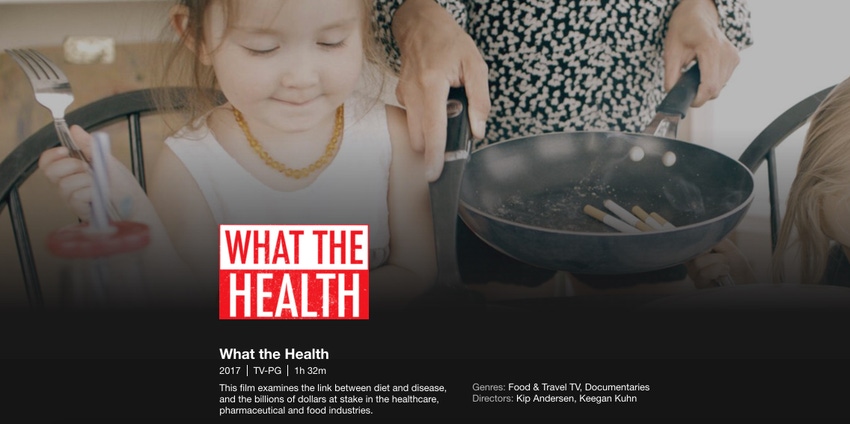A new documentary on Netflix claiming to be a health documentary is activist propaganda at its finest.
July 20, 2017

Food Inc., Cowspiracy, Forks Over Knives, King Corn, Farmageddon, Vegucated, Food Beware — these are just a handful of the popular food documentaries that have gone viral in recent years.
Riddled with misinformation, drama, suspense and plenty of fear-mongering, these pseudo-science films question modern production agriculture and foods Americans love to enjoy.
Viewers are left to feel a mixed bag of emotions — guilt, worry, fear and disgust — with the ultimate goal of many of these films for folks to ditch meat and dairy products from their diets.
Most recently, a new documentary called “What the Health” began streaming on Netflix. Created by the producers of Cowspiracy, you can about imagine the direction this film takes.
In response to the film, Nina Teicholz, author of “The Big Fat Surprise: Why Butter, Meat, and Cheese Belong in a Healthy Diet,” took some time to debunk 37 inaccurate claims made in this film. Her blog post titled, “‘What the Health’ review: Health claims backed by no solid evidence,” was featured on Diet Doctor.
She writes, “Let’s give Anderson some credit: his film is so unrelentingly terrifying and convincing that by the end, one wants to jump right on his vegan bandwagon and cease forever from eating cheese, which one person in the film calls “coagulated cow pus” or the ‘pure garbage’ of ‘dead, decaying animal flesh,’ which are Anderson’s terms for meat.
“The film does not cite a single rigorous randomized controlled trial on humans supporting its arguments. Instead What the Health presents a great deal of weak epidemiological data, case studies on one or two people, or other inconclusive evidence. Some of the studies cited actually conclude the opposite of what is claimed.
“In fact, WTH, based on zero sound science, is quite likely a piece of animal-welfare advocacy masquerading as a public health film.”
Teicholz says she’s skeptical of vegan diets in general because of a few important observations, which include:
“No human population in the history of civilization has ever been recorded surviving on a vegan diet,” she writes. “The vegan diet is nutritionally insufficient, lacking not only vitamin B12 but deficient in heme iron and folate. A near-vegan diet, in rigorous clinical trials, invariably causes HDL-cholesterol to drop and sometimes raises triglycerides, which are both signs of worsening heart attack risk.
“Over the last 30 years, as rates of obesity and diabetes have risen sharply in the U.S., the consumption of animal foods has declined steeply: whole milk is down 79%; red meat by 28% and beef by 35%; eggs are down by 13% and animal fats are down by 27%.
“Meanwhile, consumption of fruits is up by 35% and vegetables by 20%. All trends therefore point towards Americans shifting from an animal-based diet to a plant-based one, and this data contradict the idea that a continued shift towards plant-based foods will promote health,” she says.
In fact, she offers this tidbit: “There’s the entire Indian subcontinent, where beef is not eaten by the large majority of people, which has seen diabetes explode over the past decade.”
Read Teicholz’s entire rebuttal about the film by clicking here.
The opinions of Amanda Radke are not necessarily those of beefmagazine.com or Penton Agriculture.
About the Author(s)
You May Also Like





